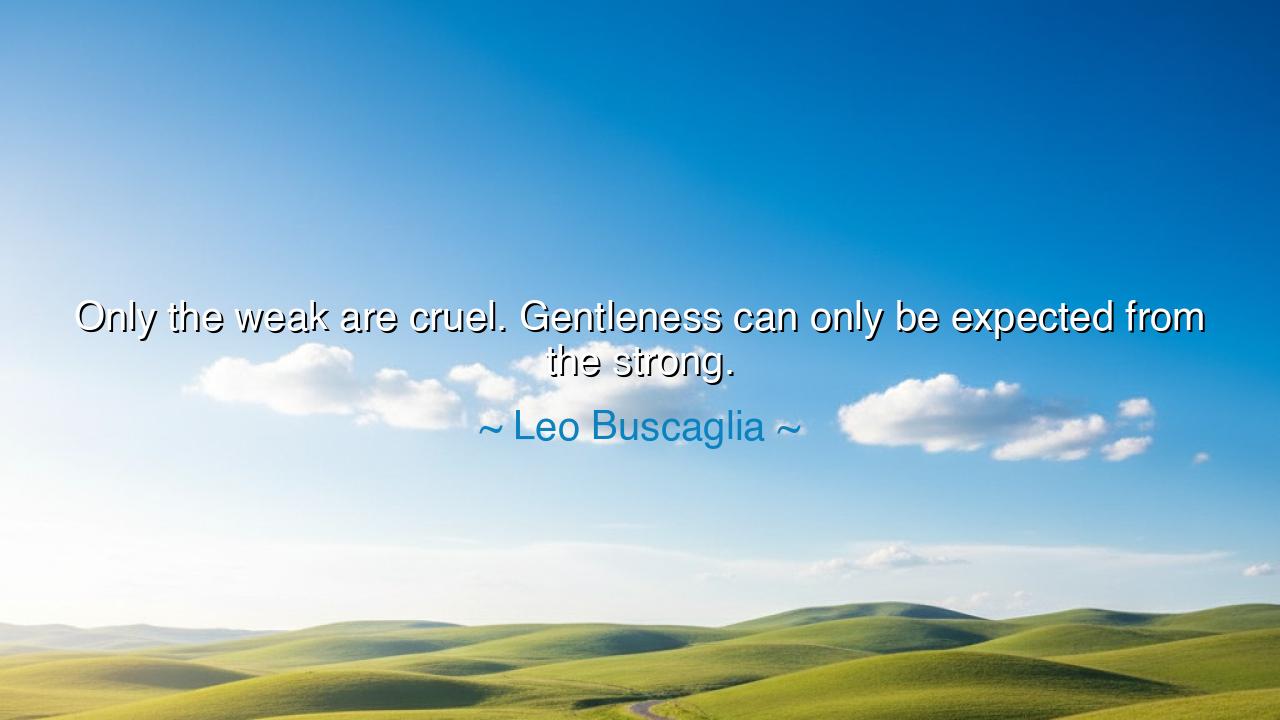
Only the weak are cruel. Gentleness can only be expected from






Leo Buscaglia, the teacher of love and humanity, spoke a truth as old as the mountains when he declared: “Only the weak are cruel. Gentleness can only be expected from the strong.” In these words is revealed the paradox of true power: that cruelty is never a sign of might, but of fear, while gentleness is the noblest expression of strength. For the weak strike to conceal their frailty, but the strong need not harm to prove themselves. They can extend kindness, because their power is already secure.
Think, then, of what cruelty truly is. It is the weapon of the fearful, the armor of the insecure. The cruel man lashes out, not because he is great, but because he trembles within. He builds his identity upon domination, hoping that by making others small, he himself will seem large. Yet cruelty is brittle—it shatters when it meets true strength. A tyrant may roar, but the roar hides a quaking heart.
By contrast, gentleness belongs to those who are steadfast and whole within themselves. The strong man or woman has no need to belittle, no hunger to crush, for they know their power cannot be taken away. They can afford patience, forgiveness, and mercy. This gentleness is not weakness, but mastery. It is the lion who lies calmly in the grass, knowing he need not prove his majesty by every passing roar. True power is quiet, steady, and kind.
Consider the story of Mahatma Gandhi, who faced the might of an empire without raising a sword. The British authorities struck, imprisoned, and mocked him, but he answered with nonviolence, with gentleness rooted in unshakable strength. His refusal to return cruelty for cruelty revealed to the world that gentleness was the stronger weapon. Empires built on brutality trembled before the calm of his spirit. Gandhi proved Buscaglia’s words: cruelty is weakness, gentleness is strength.
History offers the opposite lesson as well. Nero, emperor of Rome, wielded his cruelty like a torch, burning his enemies, his people, even his own city. Yet his reign was not secure; it collapsed in chaos and left his name a curse. His cruelty betrayed his weakness, his terror of losing power. Rome remembered not his might, but his madness. Strength endures; cruelty perishes.
What lesson, then, shall we take? That the measure of your strength is not in how hard you strike, but in how gently you hold. To be cruel is easy; to be gentle when you could be harsh is the mark of greatness. Strength is not proven in domination, but in self-mastery. The one who governs his own anger is stronger than the one who conquers a city.
In your own life, let this wisdom guide you. When provoked, choose calm instead of fury. When given the chance to belittle, choose encouragement. When you have the power to harm, choose instead to heal. These choices do not make you weak; they reveal the depth of your true strength. Practice patience with the slow, compassion with the broken, gentleness with those who lash out. By doing so, you wield a power that cruelty can never match.
So let it be passed down: only the weak are cruel, but gentleness belongs to the strong. Live not as one who must wound to feel mighty, but as one whose quiet strength inspires reverence. For cruelty dies with the cruel, but gentleness sows seeds that outlive the sower, bearing fruit for generations. Choose gentleness, and you will walk the path of the truly powerful.






AAdministratorAdministrator
Welcome, honored guests. Please leave a comment, we will respond soon